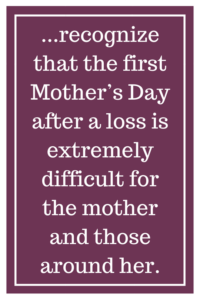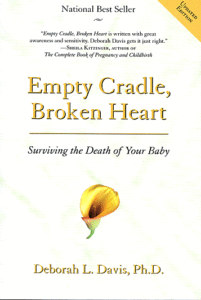As I prepared to celebrate Mother’s Day this year, I couldn’t help but think about all of the mothers I have served over the years that still have full hearts of longing, but empty arms. Whether as a doula, childbirth educator, lactation consultant, or nurse, my service has been replete with grieving mothers, mothers who never got to hold their infants in their arms.
The loss of a child doesn’t happen in isolation but affects those around the mother and child. What about the family? How are they handling the loss? What about the staff who cared for such a mother, who walked them through the loss of that child, the loss of her vision for the future. As a health care provider, as described, I’ve walked many through perinatal loss, one family who lost all of their triplets, another lost one of their twins, another expectant mother died, while many other families lost one baby. I had grieved with each of these families, but when I really came to understand the depth of perinatal loss was through the loss of several grandbabies. In fact, we have five little grandbabies awaiting us in heaven and are looking forward to meeting each of them one day.
 Because of all of these experiences, I have become an advocate for mothers with perinatal loss and recognize that the first Mother’s Day after a loss is extremely difficult for the mother and those around her. What does perinatal loss really mean? While there are different definitions, the word “perinatal” usually encompasses most of the pregnancy and the first month or so after birth. An online search with the terms “perinatal loss support” brings up a multitude of websites. So where is such a mother to turn, and how do we honor these mothers? While no one list can be all-encompassing, I would like to highlight a few of the organizations.
Because of all of these experiences, I have become an advocate for mothers with perinatal loss and recognize that the first Mother’s Day after a loss is extremely difficult for the mother and those around her. What does perinatal loss really mean? While there are different definitions, the word “perinatal” usually encompasses most of the pregnancy and the first month or so after birth. An online search with the terms “perinatal loss support” brings up a multitude of websites. So where is such a mother to turn, and how do we honor these mothers? While no one list can be all-encompassing, I would like to highlight a few of the organizations.
One organization that supports mothers who have lost a baby through their website, blog and social media is Hope Mommies. They also create remembrance boxes for the grieving mothers and have local balloon releases in honor of the babies, as well as meetings through local chapters in Albuquerque, Northern Indiana, and several Texas area chapters. Hope Mommies also sponsors a yearly retreat in Texas for mothers who have suffered perinatal loss. AMEND is an organization whose goal is to help each baby reach their first birthday through researching the cause of SIDS. The organization is physically located in Missouri and Illinois and provides free face-to-face and over-the-phone counseling to mothers and fathers who have experienced neonatal death. On their website, they highlight the position statement from the American Academy of Pediatrics in 2016 that recommends back-to-sleep as the standard for all healthy babies and how breastfeeding has been found to be associated with a reduced risk of SIDS. Their parent handout also references the AAP Safe Sleep guidelines for parents, caregivers, and daycare as well. First Candle is another organization that has three online support groups for families who have lost a baby, one for SIDS, another for stillbirth, and yet another for those experiencing miscarriage, as well as free PDFs on these subjects.
 Other groups reach out to parents with children who have already passed or are facing fatal illnesses. One such, Compassionate Passages in North Carolina, serves all types of grieving parents, including those with ill children, seeking to help them with those passings. According to their website, they also donate a book to grieving new mothers experiencing perinatal loss:
Other groups reach out to parents with children who have already passed or are facing fatal illnesses. One such, Compassionate Passages in North Carolina, serves all types of grieving parents, including those with ill children, seeking to help them with those passings. According to their website, they also donate a book to grieving new mothers experiencing perinatal loss:
What if more than one baby dies? For families who have experienced the death of one or more of their multiple birth babies, the Center for Loss in Multiple Births (CLIMB) began in 1987 and still offers services to parents of twins, triplets, and more. Having frequently recommended this organization for these parents over the years, I know they truly have understanding into the special needs of these families.
Finally, how are healthcare providers both supported and taught to support families with perinatal loss? Resolve Through Sharing is a professional organization that started in 1981. Having trained more than 50,000 health care providers around the world in supporting families with loss, your local hospital probably has someone trained to assist families with perinatal loss. Resolve Through Sharing also recommends other resources, including Faith’s Lodge retreat center for grieving parents as well as links to other organizations that could help. In addition to providing support to the grieving family, Faith’s Lodge has a thorough list of how those surrounding the grieving family can offer support.
Though difficult to discuss, according to the Center for Disease Control (CDC), stillbirth occurs one in 100 births (at 20 weeks or later). Furthermore, according to the Mayo Clinic, “10-20% of known pregnancies end in miscarriage” (before the 20th week). That means statistically, many of you reading this have also experienced perinatal loss. Did you have the support you needed to deal with the loss of your child? If so, what helped? If not, what was missing and would have been helpful? While it is a blessing that such organizations described above (plus many more) exist and are willing to serve, as you already know if you experienced perinatal loss, personal support and understanding is also needed. What happens after those precious mothers leave the hospital? Who follows up on them? Who joins them and walks beside them?
I believe it is time that we, as the community of women, were empowered through the knowledge of resources and prepared to then share this information at the appropriate time with our sisters in grief. If one-in-ten (possibly one-in-five) of all women who conceive lose their baby during the pregnancy, that means that women we pass each day could be still grieving but not have anyone safe to whom to speak. It is time to acknowledge these precious women as mothers and seek ways to support them, wherever they are in the grieving process, to become a safe place for a special mom. May we go forward and stand together as sisters in one village, arm in arm, to be sure these mothers with hearts full of grief and empty arms don’t have to walk alone any longer. To me, that’s simply a part of being a team, all focused on protecting our own!
Other articles you may be interested in:
- It’s Okay Not to Be Okay: My Fourth Miscarriage by Kristina Fortune
- Lily’s Adjustment to Sibling Loss by Penny Howard
- Living Through Loss by Melanie Wilson
- Thoughts on Loss and Grief by Julie Jeter













